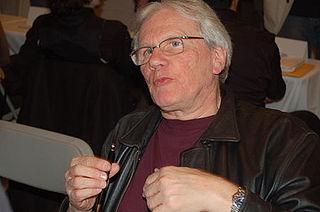A Quote by James W. Loewen
I think the first important thing is that usually most textbooks are not written by their authors. And so by author I mean the people who did not write them; so it's a new definition of "author."
Related Quotes
[D]on't ever apologize to an author for buying something in paperback, or taking it out from a library (that's what they're there for. Use your library). Don't apologize to this author for buying books second hand, or getting them from bookcrossing or borrowing a friend's copy. What's important to me is that people read the books and enjoy them, and that, at some point in there, the book was bought by someone. And that people who like things, tell other people. The most important thing is that people read.
I do that a lot of authors still do not do is allow people to write directly to me. I get about 50 fan letters a day, and I answer every single one of them myself. It takes a lot of time and sometimes it's a pain in the neck and I answer the same questions over and over. But the truth is these people come to my readings clutching these letters saying, "You wrote me back. I can't believe you wrote me back", and I think it really means a lot for them to know that the author values them just as much as they value the author.
It's not a choice. Either I write or I don't, especially when I'm in a foreign culture. I've lived in London for years, and I must continue my writing and filmmaking. The most important thing for an artist or an author is to continue her work. Languages and settings are the tools but not the first thing.
I don't think that children, if left to themselves, feel that there is an author behind a book, a somebody who wrote it. Grown-ups have fostered this quotient of identity, particularly teachers. Write a letter to your favorite author and so forth. When I was a child I never realized that there were authors behind books. Books were there as living things, with identities of their own.
At first critics classified authors as Ancients, that is to say, Greek and Latin authors, and Moderns, that is to say, every post-Classical Author. Then they classified them by eras, the Augustans, the Victorians, etc., and now they classify them by decades, the writers of the '30's, '40's, etc. Very soon, it seems, they will be labeling authors, like automobiles, by the year.
Authors have a greater right than any copyright, though it is generally unacknowledged or disregarded. They have a right to the reader's civility. There are favorable hours for reading a book, as for writing it, and to these the author has a claim. Yet many people think that when they buy a book they buy with it the right to abuse the author.
There are, first of all, two kinds of authors: those who write for the subject's sake, and those who write for writing's sake. ... The truth is that when an author begins to write for the sake of covering paper, he is cheating the reader; because he writes under the pretext that he has something to say.
I always write authors after I read their books. I've been doing it for years. I write a formal letter and send it to them in care of their agent. My mother always taught us to write thank you notes, and if an author puts themselves out there, they like to hear that their book connected with someone.






































